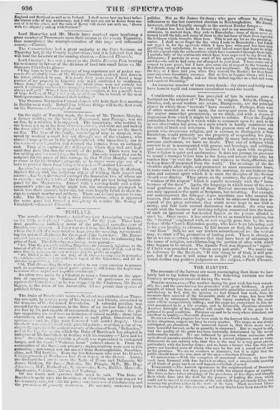Considerable excitement has prevailed of late in various parts of
Scotland on the subject of " Revivals" in religion. Kihsyth, Glasgow, Dundee, and, as our readers are aware, Blairgowrie, are the principal places in which these "revivals" have occurred. Perhaps, from want of other material to work upon, the newspaper press has taken uP the matter somewhat prematurely, as we think, and with a degree of dogmatism from which it might be better to refrain. Even the English journalists have thought it worth while to comment upon it ; and, so far as our observation has gone, in a style which is hardly consistent with the spirit of truth and soberness. In the present state of the case, any person who reverences religion, and is anxious to distinguish it from fanaticism, would probably see the propriety of suspending his judg- ment. That the " Revivals" are traceable in many instances to purely nervous excitement, we have no doubt. That sort of religion which consists in or is accompanied with groans, and hearings, and sobbings, and convulsions, we woulci be inclined to look upon -with suspicion. True religion is quiet and unobtrusive. -It does not prompt its possessor to sound a trumpet before him in the lanes and streets of the city, but teaches him "to visit the fatherless and widows in theireaftliction, and to keep himself unspotted from the world." The meetings of the Re- vivalists night after night, and protracted to most unseasonable hours, in sonic cases to one or two o'clock in the morning, do not indicate that calm and rational spirit which it is meet the disciples of the Saviotw should ever display. They prove, on the contrary, the absence of that " wisdom of the serpent" which is equally necessary with the " harm- lessness of the dove." Again, the language in which some of the reve- rend gentlemen at the head of these Revival movements indulge, is not only opposed to the spirit of Scripture, but revolting. For ex:maple, our contemporary the Glasyou; ..4egus mentions one who assured his hearers, that unless on the night on which he addressed them they ac- cepted of the great salvation, they could never hope to see God in mercy, and that their eternal damnation was sealed. No wise man would wish the business of reviving religion committed into the'hands of such an ignorant or hot-headed fanatic as the person alluded to must be. Once more : it has occurred to ns as somewhat curious, that the " Revival " originated with, or was eagerly gone into by the most furious of the Church-Extension gentry, smite have been labouring, each in his own locality, to advance, by fair means or foul, the interests of "our Zion." Still, let not our readers misunderstand us : the revivals may, we trust ted/ be, productive of lasting good. There is already, as far as we can ascertain, evideace that they have been of advantage to time cause of religion, notwithstanding the portion of alloy with which they happen to be mixed. The Apostle Paul was disposed to "rejoice" if Chriet was preached even "from envy and strife." We would say, in reference to the Revivals, "If this thing be of God, it will pros- per, but if of man it will come to nought ;" and, in the mean time, would decline any positive jadgment on the subject.—Perth Chronicle.


























 Previous page
Previous page